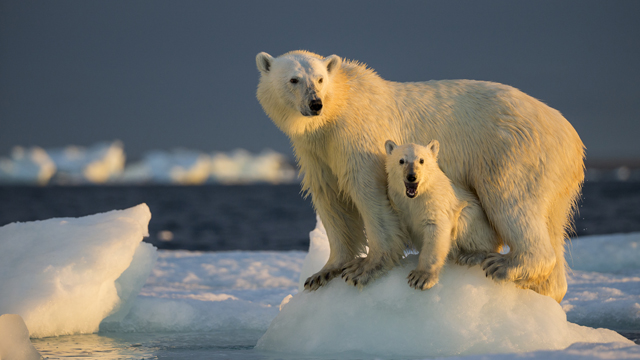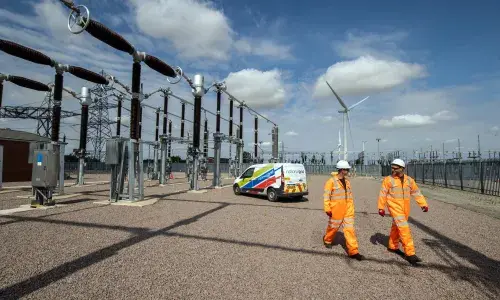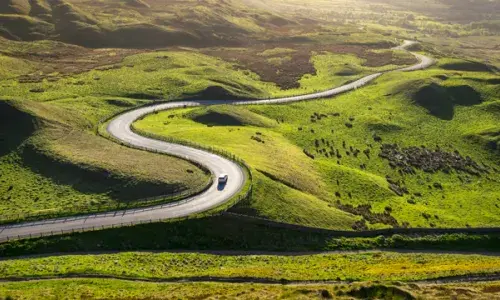
10 myths about climate change busted
As a leader in the transition to clean energy, we receive a lot of questions about the real threat that climate change poses. Here we debunk some of the most common incorrect, yet oft-repeated, climate change myths – to separate fact from fiction.
Myth 1: The climate has always been changing, this is no different
It’s true that throughout earth’s 4.5-billion-year history, the climate has changed a lot. What is different is the dramatic and unprecedented scale of climate change. The rate of temperature rise is at least 10 times faster than that of the last mass extinction about 65 million years ago, when 95% of marine and 70% of land species were wiped out. The kind of changes that would previously have happened over hundreds of thousands of years are now happening in decades.
NASA has compiled a scientifically evaluated and compelling list of evidence for rapid climate change.1 This includes:
- Global temperature rise
The planet's average surface temperature has risen 1.1 degrees Celsius (°C) – 2 degrees Fahrenheit (°F) – since the late 19th century. Most of the warming occurred in the past 40 years. - Warming ocean
The ocean has absorbed much of this increased heat, with the top 100 meters (about 328 feet) of ocean showing warming of more than 0.33°C (0.67°F) since 1969. - Shrinking ice sheets
Greenland lost an average of 279 billion tons of ice per year between 1993 and 2019, while Antarctica lost about 148 billion tons of ice per year. - Glacial retreat
Glaciers are retreating almost everywhere around the world, including in the Alps, Himalayas, Andes, Rockies, Alaska and Africa. - Decreased snow cover
Satellite observations reveal that the amount of spring snow cover in the Northern Hemisphere has decreased over the past five decades and the snow is melting earlier. - Sea level rise
Oceans absorb 90% of the extra heat from global warming and rising sea temperatures are causing glaciers and ice sheets to melt, which means that our oceans are taking up more space. Global sea level rose about 8 inches (20 centimetres) in the last century. However, the rate in the last two decades is nearly double that of the last century and accelerating slightly every year. - Extreme weather events
Climate change is causing many extreme weather events to become more intense and frequent, such as heatwaves, droughts, forest fires and floods.
The scientific evidence that climate change is a real, present threat is undeniable.
Myth 2: It’s freezing outside – so much for global warming!
Weather and climate are not the same and a cold spell in winter is definitely not a valid reason to dismiss global warming. In fact, global warming is making all sorts of extreme weather events more likely and more severe, including more intense droughts, heatwaves and hurricanes but also, strangely, an increased potential for more severe cold weather events.
Climate is the average pattern of weather for a particular region and time period, using scientific data collected over decades. The terms global warming and climate change refer to a broad temperature shift across the entire earth's surface over the course of years and decades.

But weather can change minute-to-minute, hour-to-hour, day-to-day and season-to-season in a specific location. That’s why we all love to talk about the weather – it’s always changing. A good analogy is that weather is your current mood and climate is your overall personality.
Scientists predict global warming will cause more volatile weather, with more intense hurricanes, storms, flooding and hot and cold temperature records broken. The UK Met Office reported a UK and England temperature record of 40.3°C (104.5°F) on 19 July 2022 in Coningsby, Lincolnshire. This marked a milestone in UK climate history, with 40°C (104°F) being recorded for the first time in the UK and 35°C (95°F) being recorded for the first time in Scotland.
In the Northeast US, extreme winter storms have also been on the rise. Between the winters of 2008/09 and 2017/18 there were 27 major winter storms, which is three to four times the totals for each of the previous five decades.2
In a recent Ipso MORI poll, 77% of Britons are concerned about climate change.3
Myth 3: Carbon dioxide can’t be responsible for climate change – plants, crops and trees need CO2 to grow
Plants do need carbon dioxide (CO2), that’s true. But there’s a limit to the amount they can absorb and, with deforestation increasing, this limit is getting lower. It’s not the nature of CO2 that causes problems, it’s the quantity the world is pumping out into the atmosphere.
It’s widely recognised by scientists and governments that climate change is being triggered by higher levels of greenhouse gases in the atmosphere. Their name derives from the 'greenhouse effect' these gases create by trapping heat from the sun and so warming the earth’s surface and the air above it.
CO2 is the most abundant of the greenhouse gases, and the biggest contributor to global warming, which is why cutting carbon emissions, carbon footprints or seeking low-carbon alternatives are ways we can all address climate change and achieve net zero carbon emissions by 2050.
Myth 4: There’s no way humans are responsible for climate change
Climate change is happening to an extent that cannot be explained by natural factors alone.
Global temperatures have been rising for over a century since industrialisation began. They’ve accelerated in the past 30 years and are now the highest since records began. The worldwide scientific community agrees that the global warming we are experiencing is man-made.
The vast majority of warming has come from the burning of coal, oil and gas. The combustion of these fossil fuels is flooding the atmosphere with greenhouse gases, which act like a blanket around planet Earth, trapping the heat in.
Myth 5: A temperature rise of 1.5°C is barely noticeable
Even minor temperature changes can significantly impact weather patterns and ecosystems. For example, The Intergovernmental Panel on Climate Change (IPCC) found that a 2°C temperature increase would mean that more than 2 billion people would regularly be exposed to more extreme heat than they would at a 1.5°C increase.4
Globally, that half-degree difference would also mean a loss of twice as many plants and vertebrate species and three times as many insects. Food security would also be threatened as, in some areas, crop yields would decrease by more than half.
Therefore, the Paris Agreement on climate change aims to limit average global temperature rise to “well below” 2°C, and preferably to 1.5°C, since pre-industrial times5.
Myth 6: Renewable energy is more expensive
Harnessing the power from the wind and sun is a much cheaper way of generating electricity than alternatives such as imported gas. Progress towards green electricity is the most effective way to ensure energy affordability, and home-grown renewable power could help to lower energy bills in the long term, as well as increasing energy security.
Myth 7: Renewable energy can only work when it's not cloudy or windy
The energy industry is continually developing methods for storing and sharing electricity, to ensure that it’s possible to rely on renewable energy sources even if the sun isn't shining or the wind isn’t blowing.

Some of the solutions that will help to ensure there’s enough clean energy to meet demand are:
- Sharing clean energy with neighbouring countries through interconnectors
- Using a mix of different renewable energy sources such as wind, solar, hydroelectric and bioenergy
- Using battery storage to store surplus energy, so it can be used at a time when demand exceeds generation.
What happens when the wind isn't blowing and the sun isn't shining?
Myth 8: Scientists disagree about the reality and causes of climate change
Over 97% of climate scientists agree that human activity is the primary cause of recent climate changes.
An environmental research study undertaken in 2021 revealed that 99% of peer-reviewed scientific literature found that climate change was induced by humans.6 The scientific community agrees that the global warming we’re facing isn’t natural and is something that humans are causing.
Myth 9: It’s solar changes that are causing the earth to warm, not us

The sun powers life on earth, keeping the planet warm enough for us all to survive. The sun also influences earth’s climate; subtle changes in earth’s orbit around the sun were responsible for past ice ages.
But the global warming we’ve seen over the last few decades is too rapid and dramatic to be linked to changes in earth’s orbit, and too large to be caused by solar activity.
The IPCC concluded that warming from increased levels of human-produced greenhouse gases is actually many times stronger than any climate change effects due to the sun.
NASA’s conclusion is even more dramatic; since 1750, the warming driven by greenhouse gases from our burning of fossil fuels is over 50 times greater than the slight extra warming coming from the sun itself over that same time interval.7
Myth 10: There’s no point doing anything – it’s all too late
This is a critical time to take action on climate change and it can be done.
The latest reports from the Intergovernmental Panel on Climate Change (IPCC)8 have made it clear that we’re running out of time, but there is still a limited window of opportunity to implement policies and take action this decade to ensure we avoid the worst effects of climate change. It’s still possible for the world to reach net zero and to limit warming to 1.5°C, but much more action is needed this decade, from governments, businesses and others, to make that happen.
The technology and systems to achieve net zero carbon emissions by 2050 already exist and energy companies, industry, vehicle manufacturers and governments have an essential part to play. This is a priority for us as a company and we’re committed to delivering a clean energy future, by helping to connect more clean, affordable energy to homes and businesses in both the UK and US. Our commitments include:
- achieving net zero for our Scope 1, 2 and 3 emissions by 2050
- restoring the natural environment by 10% on the land we manage in the UK and preserving the natural environment in the land we manage in the US
- investing in the decarbonisation of the future of energy, adapting to climate change and using our resources responsibly.
Find out more about our responsible business commitments
But individually, we can also each make greener daily decisions and take actions that collectively will affect the planet for good – from the way we travel to what we buy and eat.
Take a look at our 10 tips for saving energy in your home
Sources
2 The New York Times: How climate change is affecting winter storms
5 The Paris Agreement | UNFCCC


